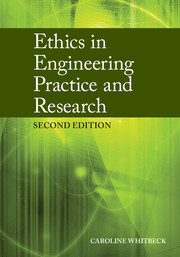Book contents
- Frontmatter
- Contents
- Note to Students
- Foreword to the First Edition
- Preface to the First Edition
- Acknowledgment
- Acknowledgments to the First Edition
- Part 1 Values and the Evaluation of Acts in Engineering
- Part 2 Engineering Responsibility
- 3 Ethics as Design ??? Doing Justice to Moral Problems
- 4 Central Professional Responsibilities of Engineers
- 5 Computers, Software, and Digital Information
- 6 Rights and Responsibilities Regarding Intellectual Property
- 7 Workplace Rights and Responsibilities
- Part 3 Responsible Research Conduct
- Part 4 The Future of Engineering
- References
- Index
- References
5 - Computers, Software, and Digital Information
Published online by Cambridge University Press: 05 June 2012
- Frontmatter
- Contents
- Note to Students
- Foreword to the First Edition
- Preface to the First Edition
- Acknowledgment
- Acknowledgments to the First Edition
- Part 1 Values and the Evaluation of Acts in Engineering
- Part 2 Engineering Responsibility
- 3 Ethics as Design ??? Doing Justice to Moral Problems
- 4 Central Professional Responsibilities of Engineers
- 5 Computers, Software, and Digital Information
- 6 Rights and Responsibilities Regarding Intellectual Property
- 7 Workplace Rights and Responsibilities
- Part 3 Responsible Research Conduct
- Part 4 The Future of Engineering
- References
- Index
- References
Summary
What Is Different about Digital Systems and Digital Information?
What characteristics of digital systems and digital information set them apart from other technology and influence the morally significant problems faced by the engineers who work with them?
Digital systems and digital information have some special characteristics that influence the morally significant problems faced by engineers (IT professionals) who work with them, the engineering profession, and society in general. In Chapter 1 (the discussion of the engineering profession's criteria for responsible practice), we noted NAE past president Bill Wulf's observation that because digital systems are not continuous, a small change in a digital system (such as one bit in the memory of a computer) can produce a radical change in the behavior of the system. As a result, some devastating effects of computer “bugs” are due not to human error or negligence but to unpredictable new characteristics of the system (“emergent properties”). As Wulf also argues, the lack of continuity in a digital system also creates insurmountable problems for testing such systems, for example, computers.
These special characteristics of digital systems give rise to the question of criteria for responsible engineering of software when one knows in advance that some behaviors of the resulting system will be unpredictable. Wulf sees this question as one for the engineering profession, rather than the individual engineer, to answer. (We will examine such “macro problems” further in Chapter 10.)
- Type
- Chapter
- Information
- Ethics in Engineering Practice and Research , pp. 192 - 210Publisher: Cambridge University PressPrint publication year: 2011



